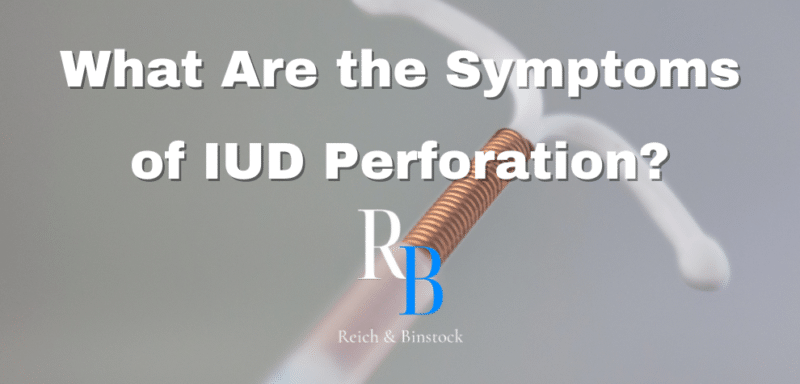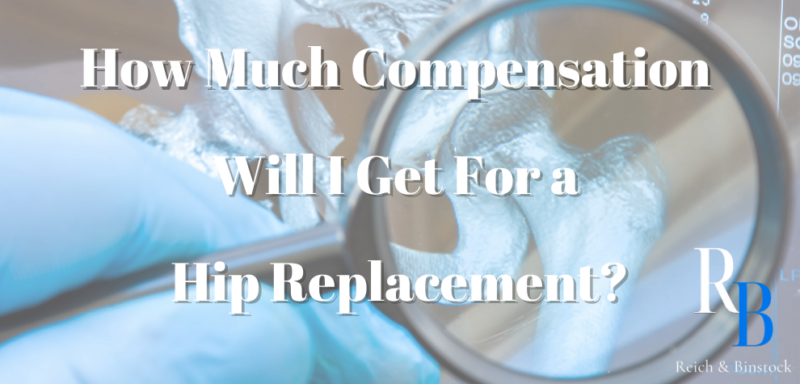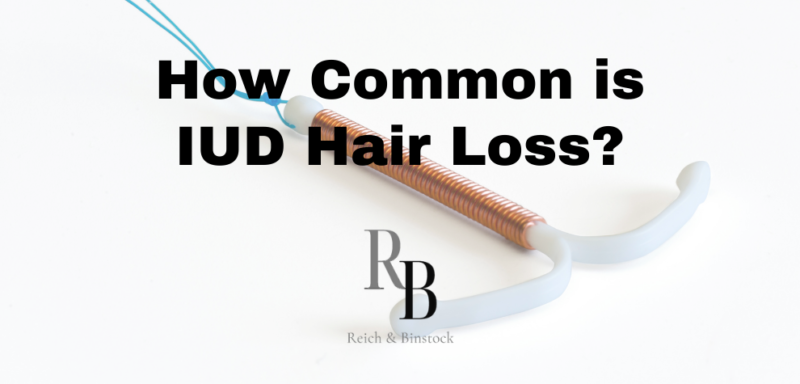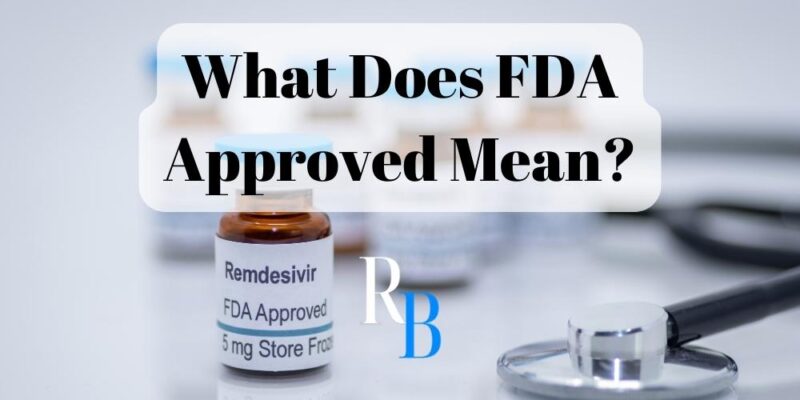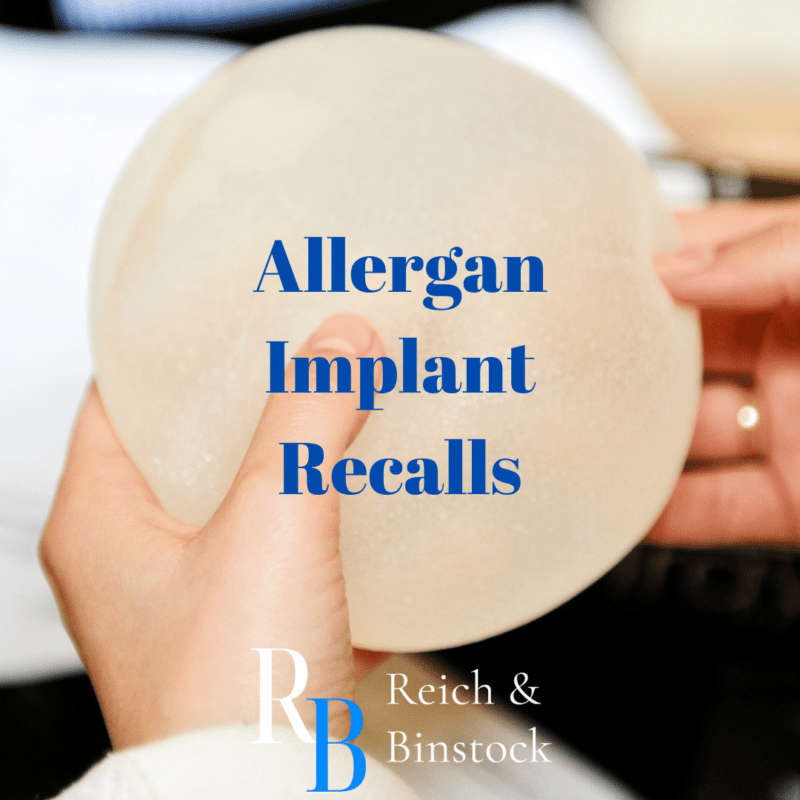Philips CPAP Recall Lawsuit
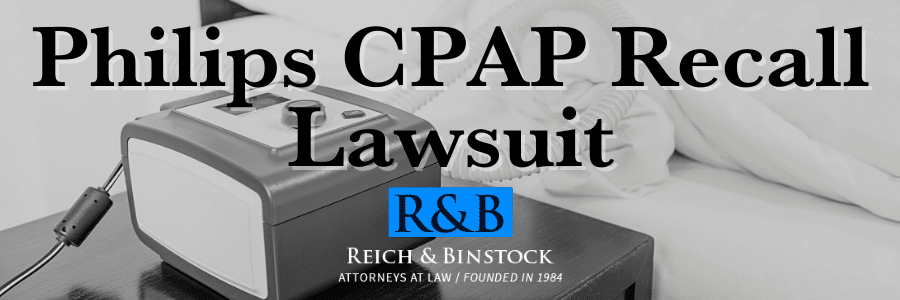
Philips CPAP Recall Lawsuit Attorneys in Houston
Every time we start using certain medical devices, we trust that they will operate in a safe and effective manner. Unfortunately, these products often come with or develop dangerous risks over the duration of their use. Sometimes, manufacturers overlook dangerous flaws, and other times they fail to provide adequate warnings. As a result, we see cases such as the current Philips CPAP Recall Lawsuit. With the help of a qualified defective medical device attorney, you may be entitled to compensation.
At Reich & Binstock, we have extensive experience handling class action and MDL cases originating from all across the country. The current litigation surrounding the Philips CPAP recall lawsuit is very important. Obstructive Sleep Apnea (OSA) is one of the most prevalent sleep disorders in the United States, according to the NCBI. Therefore, defective sleep apnea machines have the potential to affect hundreds of thousands, if not millions, in the States alone. That’s why Reich & Binstock pledge to fight tooth and nail for those who suffered injuries or illnesses due to defective medical devices. To see if you qualify, or to schedule a free consultation, please call our office at 713-622-7271 or fill out our online intake form.
What Is a CPAP Machine?
Most often, doctors recommend a continuous positive airway pressure (CPAP) machine to treat sleep apnea disorders, such as obstructive sleep apnea (OSA). OSA causes disruptions and breaks in the breathing of those affected. This usually happens when the airways temporarily become blocked.
CPAP machines keep a constant flow of oxygen through your nose and mouth while you sleep. Thus, it allows you to keep your airways open, helping you breathe regularly. Below, we explain how these machines work, as well as why some are filing lawsuits associated with them.
How Do CPAP Machines Work?
The compressor, or motor, of a CPAP machine produces a constant stream of pressured air that passes through an air filter and into a flexible tube. This tube pushes clean air into a mask that fits over your nose and mouth.
The flow of air from the CPAP machine presses against any obstructions in your airways as you sleep, allowing enough oxygen to reach your lungs. Your breathing does not pause since there is nothing blocking the passage of oxygen. As a consequence, you don’t have to wake up every time you want to restart breathing. Additionally, there are a few different types of CPAP masks that people use. We list these below.
- Nasal pillow mask: A soft cushion covers your nose region in this sort of mask. Prongs that fit into your nostrils may also be present. This mask makes it simple to wear your glasses. It’s also useful if you have a lot of facial hair that would make a bigger mask too tight to wear.
- Nasal mask: This is a padded mask that completely covers your nose. If you move around a lot when sleeping, this could be a better alternative. It has the ability to deliver a high-pressure flow of air.
- Full mask: The lips and nose are covered by this kind, which is formed like a triangle. If you breathe via your mouth while sleeping or if you have a blockage in your nose, your doctor may recommend this mask.
Difference Between CPAP, APAP, and BiPAP Machines
APAP and BiPAP machines are two more types of breathing equipment. The following is a list of the differences between them.
- CPAP machine: This apparatus is set up to create pressurized air at a single constant pressure. You must reset the device’s settings to alter the air pressure.
- APAP machine: Throughout the night, this kind monitors your respiration. It compensates for changes in your sleep position or drugs that may have affected your breathing by automatically adjusting the air pressure.
- BiPAP machine: There are two pressure settings on this device: one for breathing in and one for exhaling. It’s for those who can’t sleep with a CPAP machine or have high carbon dioxide levels in their blood. For individuals with central sleep apnea, BiPAP devices can additionally have a backup respiratory rate. Because the major difficulty with central sleep apnea is starting breath, the backup respiratory rate guarantees that the person breathes.
What Sleep Apnea Machines Were Included in the Recall?
Below, we list the affected devices. Impacted devices include ventilators, CPAP machines, and BiPAP machines. These devices include those manufactured before the 26th of April, 2021. It also includes all serial numbers.
- E30 (Emergency Use Authorization)
- DreamStation ASV
- DreamStation – ST, AVAPS
- SystemOne – ASV4
- C Series – ASV, S/T, AVAPS
- OmniLab Advanced Plus
- SystemOne (Q Series)
- DreamStation – CPAP, Auto CPAP, BiPAP
- DreamStation GO – CPAP, APAP
- Dorma 400, 500 – CPAP
- REMStar SE Auto – CPAP
- Trilogy 100 Ventilator
- Trilogy 200 Ventilator
- Garbin Plus, Aeris, LifeVent Ventilator
- A-Series BiPAP Hybrid A30
- A-Series BiPAP V30 Auto Ventilator
- A-Series BiPAP A40
- A-Series BiPAP A30
As new materials and technologies become available, products that are not impacted may have alternative sound abatement foam materials. Additionally, due to device design, sound abatement foam in unaffected devices may be positioned in a different area.
Why Are People Filing a Philips CPAP Recall Lawsuit?
Certain people are currently filing lawsuits against Philips because of a recall in their sound abatement foam found in the devices. This foam has the potential to cause serious injuries, such as cancer and respiratory problems. Lawsuits filed by individuals seek compensation for those injuries. They also claim that Philips manufactured defective devices and failed to warn the public of potential risks and dangers. Certain class action MDL lawsuits also ask that Philips cover the cost of replacement CPAP machines.
Philips sent out a recall notice in June of 2021. The recall affected millions of manufactured devices. The company stated that the foam, when degraded, potentially releases toxic vapors and black particles into the masks of the users.
Additionally, Philips mentioned on September 1st, 2021 that they intend to either repair or replace affected devices. However, this process might last a year or longer. During the waiting period, CPAP users might need to find an alternative device.
What Injuries Are Named in the Philips CPAP Recall Lawsuit?
Degraded sound abatement foam can lead to a number of health issues, including cancer and organ damage, according to the Philips CPAP recall lawsuit. Headaches, airway irritation, chest tightness, cough, and sinus infection have been reported to Philips. However, other potential health concerns include serious harm that might be life-threatening or result in lifelong disability, even wrongful death. Below, we include a long list of injuries associated with the use of recalled Philips devices.
- Kidney disease of damage
- Liver disease or damage
- Lung disease or damage
- Respiratory failure
- Reactive airway disease (RAD)
- Acute respiratory distress system (ARDS)
- Pleural effusion
- Chemical poisoning
- Bladder cancer
- Brain cancer
- Breast cancer
- Hematopoietic cancer
- Kidney cancer
- Leukemia
- Liver cancer
- Lung cancer
- Lymphatic cancer
- Multiple myeloma
- Nasal cancer
- Non-Hodgkin’s lymphoma
- Papillary carcinoma
- Prostate cancer
- Rectal cancer
- Stomach cancer
- Testicular cancer
- Thyroid cancer
- Esophageal cancer
What Are Symptoms of Exposure to CPAP Foam Particles and Chemicals?
Degraded foam from Philips CPAP machines may emit a variety of hazardous compounds, including toluene diamine, toluene diisocyanate, diethylene glycol, dimethyl diazine, and phenol, 2,6-bis (1,1-dimethylethyl)-4-(1-methylpropyl)-, according to Philips lab testing. Unfortunately, these chemicals have the potential to cause serious side effects, such as the following.
- Irritation and inflammation of the airway
- Asthma
- Carcinogenic effects
- Pressure in the chest
- Coughing
- Dizziness
- Headaches
- Hypersensitivity
- Inflammatory response
- Damage to the organs
- Sinus infection
- Skin, eye, or respiratory tract irritation
- Upper airway irritation
Who Qualifies to File a Philips CPAP Recall Lawsuit?
Anyone who has suffered the Philips CPAP adverse effects described above while using a recalled Philips Bi-PAP, CPAP, or ventilator, or who has lost a loved one as a result of these injuries, may be entitled to bring a lawsuit.
Many forms of cancer, respiratory difficulties, and organ damage have all been linked to using recalled Philips CPAP equipment, according to pending lawsuits. If you have experienced any of the injuries listed above, you may be eligible for compensation.
If you’re not sure if you qualify, a CPAP lawyer may assist you at no expense in determining your eligibility. Make an appointment with an attorney straight away.
Why Should You File a Philips CPAP Recall Lawsuit?
If you or someone you love suffered injuries, you deserve fair compensation. At Reich & Binstock, we currently handle Philips CPAP recall lawsuit cases on behalf of injured individuals. We offer free and confidential consultations to determine whether or not you qualify. Time is of the essence in any personal injury case, so we recommend speaking with an attorney as soon as possible.
A malfunctioning BiPAP, CPAP, or ventilator might cause catastrophic injury to you or a loved one. By filing a case, you may be able to recover past and future medical expenses, hold Philips responsible for placing you or a loved one in danger, and get compensation for pain and suffering.
What Is the Status of the Philips CPAP Recall Lawsuit?
The Philips CPAP cases are still in the early stages, and no settlements or jury judgments have yet been reached. Lawyers anticipate a high number of lawsuits as a result of the recall of millions of CPAP, BiPAP, and ventilator equipment.
The United States Judicial Panel on Multidistrict Litigation (JPML) will hear arguments on Sept. 30, 2021, in the Eastern District of Pennsylvania, to consolidate 32 Philips CPAP cases into a multidistrict litigation (MDL).
Potential Settlement Compensation
While it is difficult to provide a completely accurate estimation of the potential compensation, some attorneys have speculations. However, bear in mind that it is still very early in the litigation process. Speaking with an attorney about your specific situation is the best way to receive a settlement estimation.
Jury decisions in bellwether trials often provide plaintiffs and defendants with an estimate of the worth of their case. However, cases can settle at any point before trial. No trial dates have been established as of yet.
Potential Questions Lawyers Might Ask to See if You Qualify
In order to determine whether or not you qualify for a Philips CPAP recall lawsuit, your attorney will ask various questions. We include likely questions below.
- Which Philips machine did you use for sleep apnea?
- Did you keep the recalled machine?
- What serious injuries have you experienced from using your device?
- What symptoms have you experienced?
- Why do you want to file a Philips CPAP recall lawsuit?
Contact a Defective Medical Device Lawyer in Houston Today
When doctors recommend a certain medical device to better your quality of life, you expect that device to perform as intended. However, these devices sometimes have risks because of errors in the manufacturing process or negligence on the part of the company. When you become a victim of injuries due to defective medical devices, you deserve compensation. For qualified representation in a CPAP lawsuit, please contact Reich & Binstock. Call our Houston office at 713-622-7271, or fill out our online intake form.
There is never a fee unless we recover on your behalf.
Additionally, clients are not obligated to pay expenses if a recovery is not made.












